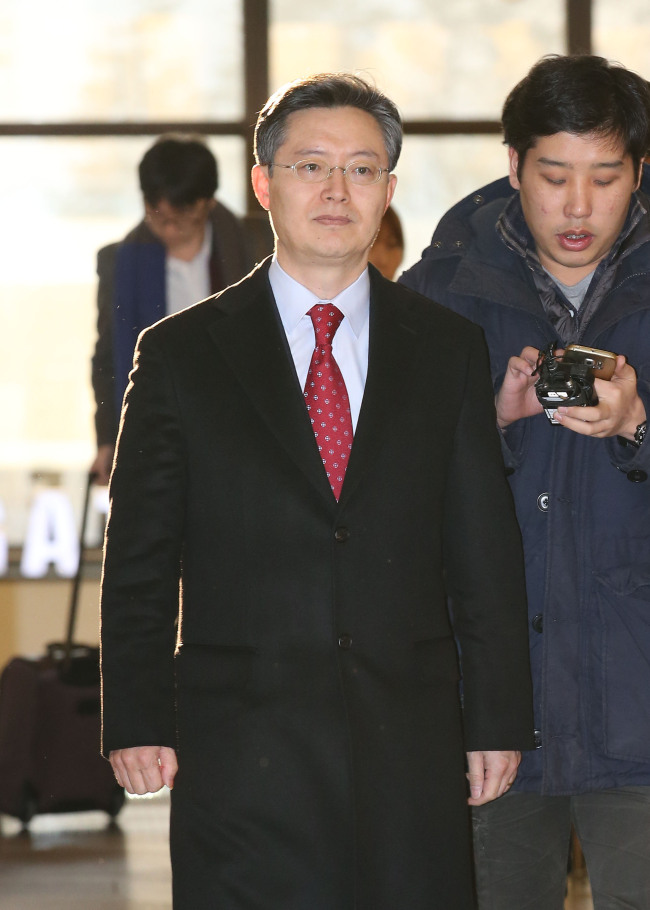The top nuclear negotiators of South Korea and China gathered Thursday in Beijing as Seoul and Washington and other countries are striving to bring Beijing onboard their drive to levy stricter sanctions over North Korea’s fourth nuclear test.
Hwang Joon-kook, special representative for Korean Peninsula affairs at Seoul’s Foreign Ministry, flew to the Chinese capital early in the morning for talks with Wu Dawei, Beijing’s special representative for Korean affairs.
 |
| Hwang Joon-kook, South Korea’s special representative for Korean Peninsula affairs at Seoul’s Foreign Ministry, arrives at Gimpo Airport to fly to Beijing to meet with his Chinese counterpart on Thursday. Yonhap |
With last week’s atomic experiment topping the agenda, Hwang was expected to prod Wu to endorse strong punishment on his country’s increasingly defiant and volatile neighbor.
Beijing’s role is pivotal given its veto power at the U.N. Security Council and decades-old diplomatic and economic patronage of Pyongyang that has long been deemed a cushion for the Kim dynasty’s survival.
“As a permanent UNSC member, China has the biggest sway over North Korea and thus will play the most important role in formulating the response to the latest crisis,” Hwang told reporters shortly before his departure.
Following a meeting on Wednesday with his U.S. and Japan counterparts, Sung Kim and Kimihiro Ishikane, Hwang said there was a “sufficient chance” for China’s support given its unwavering opposition to the North’s atomic tests, though Seoul and Beijing may not be “on the exact same page.”
During the talks, Seoul, Washington and Beijing vowed to give a “strong response” to the provocation. With the U.S. driving the sanctions initiative, they are believed to be seeking steps to further squeeze North Korean trade and finance such as a partial ban on banking transactions and ship entries to overseas ports.
The prospects appear dim, however, as Wu stressed the need for “reasonable” measures during a phone call with Hwang last Friday, though he expressed his willingness to cooperate.
Adding to the gloom is Moscow, another veto-wielding nation. While displaying concerns about Pyongyang’s nuclear program, Russian Foreign Minister Sergey Lavrov urged “restraint” and dialogue during his phone conversation with his South Korean counterpart Yun Byung-se on Thursday, and Russian Ambassador to the U.N. Vitaly Churkin called for “cool heads” and a “proportionate response” ahead of an emergency UNSC session over the nuclear test on Jan. 6.
The discussions are poised to kick into high gear in the coming days, with Seoul’s Vice Foreign Minister Lim Sung-nam slated for talks with U.S. Deputy Secretary of State Tony Blinken and Japanese Vice Foreign Minister Akitaka Saiki on Saturday in Tokyo.
Blinken, who is forecast to travel to Beijing afterward, reaffirmed Washington’s pledge to craft “grave” steps for the Kim Jong-un regime to “pay substantial prices” during his phone conversation with Lim on Wednesday, Seoul’s Foreign Ministry said in a statement.
Hwang plans to return home Friday.
The nuclear experiment is likely to be on the agenda for a working-level defense policy consultation scheduled to take place between the two countries’ defense ministries on Friday in Seoul.
The annual director-general-level meeting, initiated in 1995 and last held in Beijing in December 2014, will be led by Yoon Soon-ku, director general for international policy at Seoul’s Defense Ministry, and Guan Youfei, director of foreign affairs at Beijing’s Ministry of National Defense.
“Through the talks, the sides will discuss the current security situation on the peninsula and in the region and trade views on ways to advance bilateral defense exchanges and cooperation,” ministry spokesman Kim Min-seok said at a news briefing on Thursday.
By Shin Hyon-hee (heeshin@heraldcorp.com)



